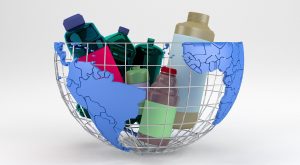Since the World Economic Forum and the Ellen MacArthur Foundation launched the report ‘The New Plastics Economy’ in January 2016, presenting, for the first time, the vision of a global economy in which plastics never become waste, these reports have become a global benchmark, making headlines around the world.
This report, and the next report produced in 2017, have largely shifted the global plastics debate, marshalling a systemic shift towards the common vision of a circular economy for plastics, with the commitment of the industry, government policies and increased public awareness all supporting each other to make it a reality.
Other topics of interest: What the new EU plan for the supply of key raw materials means
Building on the success of the reports, over the past four years, the New Plastics Economy initiative has brought companies and governments together supporting a common vision of a circular economy for plastics by redesigning its future, and starting with packaging. Currently, the initiative is catalysing change within the plastics industry and has already over a thousand organizations supporting it. This vision is based on three key actions: eliminate, innovate, and circulate, and is based on the following principles:
Dialogue
Collaboration along the value chain is key to solving challenges that no single organization can address on its own. And, building on this strong conviction, the initiative works with a group of organizations to drive collaborative projects. This group includes global consumer goods companies, retailers, packaging manufacturers and plastic producers, along with companies involved in collection, sorting and reprocessing. An advisory board of philanthropic companies is also part of the initiative, to ensure that a wide range of social, environmental, and commercial issues are included.
Global commitment
It is essential that the governments and companies involved in all phases of the plastics production chain are committed and believe in the initiative. This is why, in October 2018, in collaboration with the United Nations Environment Programme (UNEP), the Global Commitment to a New Plastics Economy was launched, bringing together more than 500 organisations to work on a common vision and an ambitious set of targets to tackle plastics waste and pollution at its source by 2025. Signatories include companies representing 20% of all plastic packaging produced worldwide, as well as governments, NGOs, universities, industry associations, investors, and other organisations.
The Plastics Pact
The Plastics Pact, a network of local and regional (cross-border) initiatives that brings together key stakeholders to implement solutions that promote the circular economy for plastics, supports the implementation of a common vision worldwide. The initiative is led by a local organisation and connects governments, businesses, and citizens towards a common vision through an ambitious set of local objectives. Since its launch, the Plastics Pact has proven to be a unique platform to share learning and best practices between regions, speeding up the transition to a circular economy for plastics.
Innovation
Innovation is essential for businesses and governments if goals are to be met. Thanks to the New Plastics Economy Innovation Award, the initiative continues to catalyse innovation and drive thinking towards scalable solutions for a circular economy in the industry.
Communication and stakeholder engagement
Businesses, policy makers, investors, NGOs, academics, designers, citizens, industry associations and other actors play a vital role in the transition to a new system. The initiative learns from, informs, and engages all these stakeholders. As a globally respected voice on the circular economy and plastics, it seeks to encourage greater communication and stakeholder engagement, spreading the vision of a circular economy for plastics around the world.







